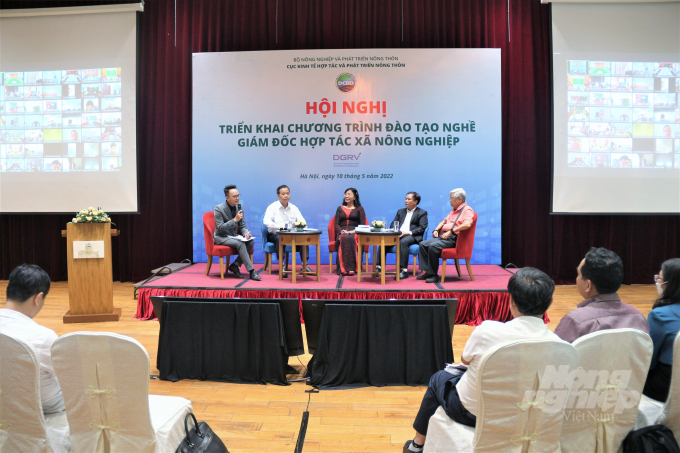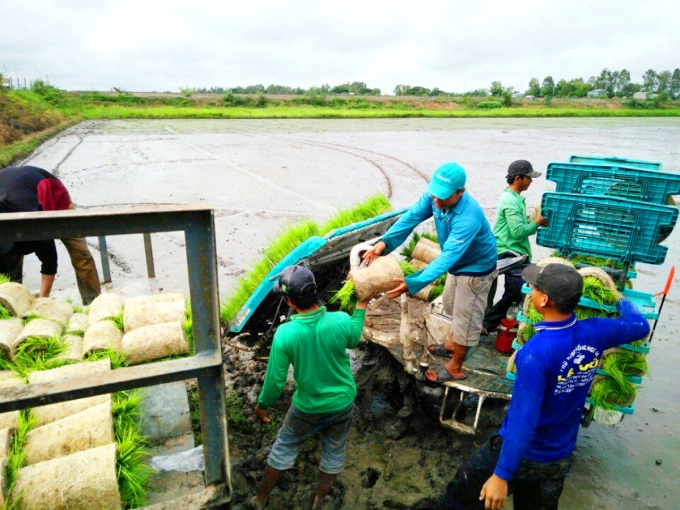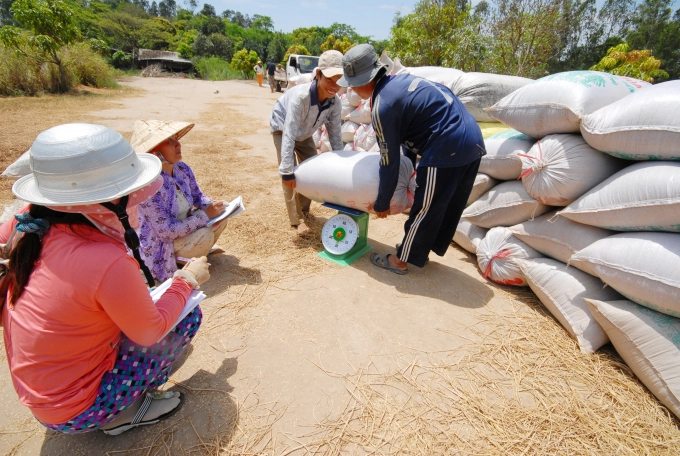November 10, 2025 | 07:42 GMT +7
November 10, 2025 | 07:42 GMT +7
Hotline: 0913.378.918
November 10, 2025 | 07:42 GMT +7
Hotline: 0913.378.918

The conference to deploy the program on training managers of agricultural cooperatives is held on May 10. Photo: Pham Hieu.
According to the report of the Agency of Cooperatives and Rural Development under the Ministry of Agriculture and Rural Development (MARD) almost 18,3000 agricultural cooperatives have been established nationwide. Despite the fact that the rate of effective cooperatives increased to 60% the internal capacity of many cooperatives, especially managing skills remained weak, while it’s a decisive factor to the development of cooperatives, especially in the current market-oriented economy.
Although the background of each cooperative is different, they share the same thing that is incompetent management staff who are not classically trained and lack of skills on administration, organization and market knowledge.
As of December 31, 2021, only 16% of agricutural cooperative managers had college, university or higher degrees. 33% of cooperative managers received elementary or secondary vocational training and up to 51% were not trained.
With the orientation of restructuring and developing agriculture toward the establishment of specialized and concentrated growing areas, promoting value chain-based linkages and improving the quality of farm produce, it requires the agricultural sector to strongly invest in science and technology to produce high-quality products that meet market demand as well as competitive requirements.
Therefore, vocational training for rural employees and improving capacity for agricultural cooperatives is crucially important in the coming time with the focus on training managers for the cooperatives. The target is to have about 80% of cooperative managers receiving elementary vocational training by 2030 according to Decision No.340/QĐ-TTg dated March 12, 2021 of the Prime Ministry.

As of December 31, 2021, only 16% of the cooperative managers had college, university or higher degrees. 33% received elementary or secondary vocational training and up to 51% were not trained. Photo: Le Hoang Vu.
To improve the quality of human resources, in particular agricultural cooperative managers and to meet the demand for training courses of agricultural cooperative managers, in 2020 the MARD assigned Thai Nguyen University of Agriculture and Forestry and School of Management for Agriculture and Rural Development II to organize pilot training program and give elementary vocational training certificates to 154 trainees in the North and the South.
All the trainees agreed that the program not only provided them with the knowledge of cooperative administration and management to adapt to the new situation but also helped their cooperative operate effectively.
The MARD assigned the Agency of Cooperatives and Rural Development in cooperation with some specialized lecturers and experts to design training program and creating curriculum for “training agricultural cooperative managers”. The program received the approval from the Ministry of Labour - Invalids and Social Affairs (MOLISA)
On November 17, 2021, the MARD issued Decision No. 4468/QĐ-BBB-KTHT, approving elementary vocational training program and “Training Managers of Agricultural Cooperative” curriculum. The program applies to all vocational training facilities nationwide.
The managers of agricultural cooperatives, cooperative groups or those who desire to equip themselves with the knowledge of agricultural cooperatives can apply to attend the training courses. The target is to have about 80% of cooperative manager receiving elementary vocational training or higher levels by 2030.

The target is to have about 80% of cooperative manager receiving elementary vocational training or higher levels by 2030. Photo: Le Hoang Vu.
The “Training Managers of Agricultural Cooperatives” curriculum is designed to include 3 modules with the content of agricultural cooperatives, agricultural cooperative management and building skills on agricultural cooperative management. At first, the MARD plans to organize 20 pilot training classes for 500 cooperatives in the standard raw material growing areas, outstanding cooperatives and those in the Coop.66 network.
According to Director of the Agency of Cooperatives and Rural Development Le Duc Thinh, the biggest purpose of the program is to create a generation of cooperative managers who have enough knowledge and skills to operate cooperatives in a transparent and effective way.
“The program will arrange the content of cooperative administration professionally and effectively in the same way as the program for business management including marketing administration, cooperative service administration, agricultural production administration, human resource management in cooperatives and finance administration,” said Le Duc Thinh.
Translated by Mai Tham

(VAN) Viet Nam is proactively adapting to climate change, improving its institutional framework, fostering innovation, and strengthening international cooperation to achieve net-zero by 2050.

(VAN) Vietnam promotes integrated management of seas and oceans, institutional improvement, innovation, and international integration, aiming to become a prosperous and sustainable maritime nation.

(VAN) Khanh Hoa Province is rapidly transitioning to high-tech marine aquaculture to adapt to climate change and enhance the value and output of its seafood.

(VAN) As the world marks the 80th anniversary of the United Nations, progress in ending hunger — the world's most solvable problem - is falling behind.
/2025/11/07/3118-0-nongnghiep-133114.jpg)
(VAN) The Prime Minister requested ministries, sectors, and localities to identify the development of science and technology, innovation, and digital transformation as a key and urgent political task.

(VAN) Innovation is emerging as a central driving force behind Viet Nam’s transformation toward a green, modern, and sustainable agricultural model.
/2025/11/06/3843-2-212949_172.jpg)
(VAN) Deputy Minister Phung Duc Tien suggested Thanh Hoa province strengthen the control of fishing vessels, strictly handle violations, and join nationwide efforts to lift the 'yellow card' imposed on Vietnamese seafood.